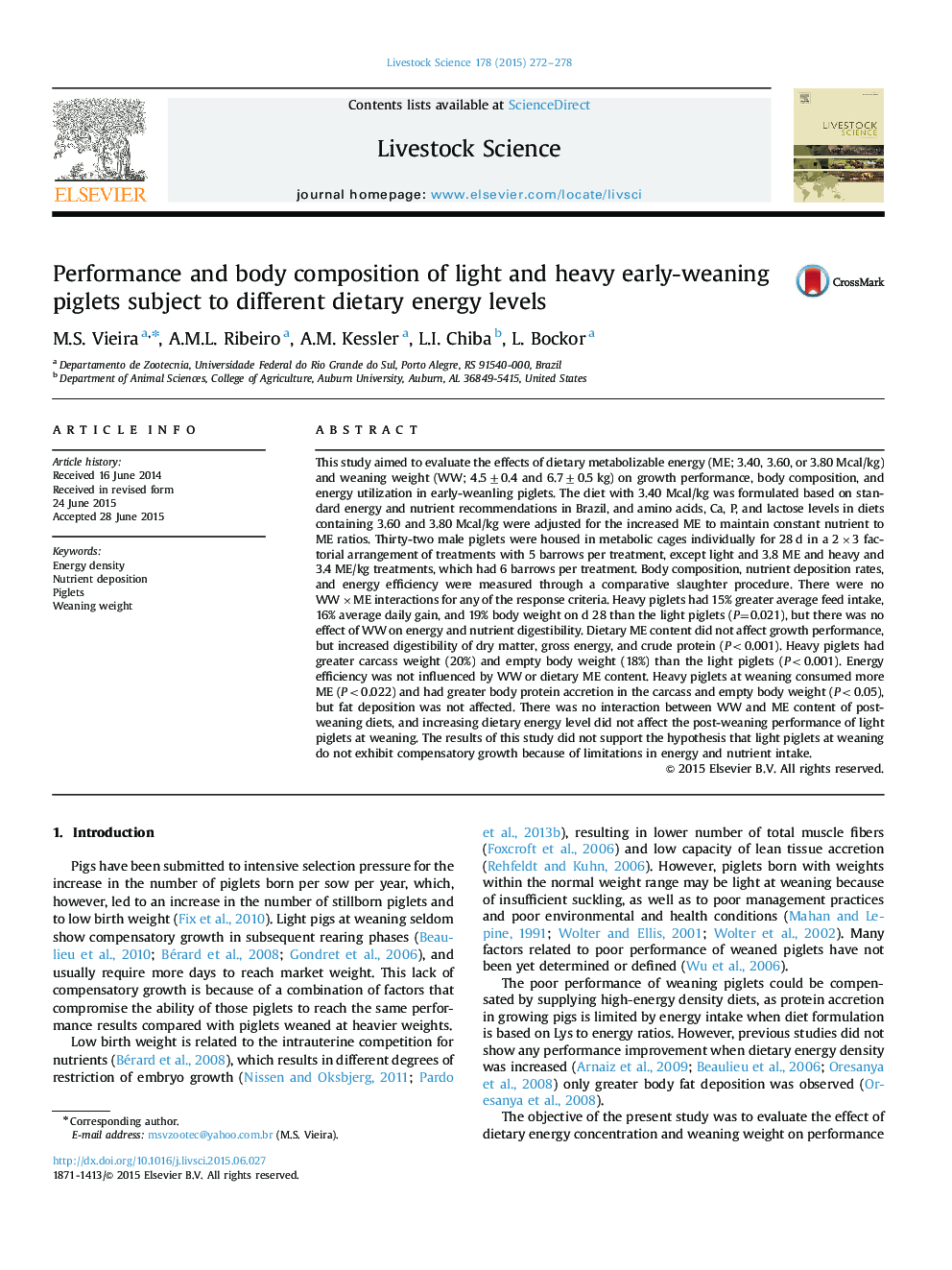| کد مقاله | کد نشریه | سال انتشار | مقاله انگلیسی | نسخه تمام متن |
|---|---|---|---|---|
| 2447087 | 1553954 | 2015 | 7 صفحه PDF | دانلود رایگان |
عنوان انگلیسی مقاله ISI
Performance and body composition of light and heavy early-weaning piglets subject to different dietary energy levels
ترجمه فارسی عنوان
عملکرد و ترکیب بدن از خوک های سبک و سنگین زودگذر که به سطوح مختلف انرژی غذایی رسیده اند
دانلود مقاله + سفارش ترجمه
دانلود مقاله ISI انگلیسی
رایگان برای ایرانیان
کلمات کلیدی
تراکم انرژی، رسوب مواد مغذی، بچه گانه، وزن خوابیده،
موضوعات مرتبط
علوم زیستی و بیوفناوری
علوم کشاورزی و بیولوژیک
علوم دامی و جانورشناسی
چکیده انگلیسی
This study aimed to evaluate the effects of dietary metabolizable energy (ME; 3.40, 3.60, or 3.80 Mcal/kg) and weaning weight (WW; 4.5±0.4 and 6.7±0.5 kg) on growth performance, body composition, and energy utilization in early-weanling piglets. The diet with 3.40 Mcal/kg was formulated based on standard energy and nutrient recommendations in Brazil, and amino acids, Ca, P, and lactose levels in diets containing 3.60 and 3.80 Mcal/kg were adjusted for the increased ME to maintain constant nutrient to ME ratios. Thirty-two male piglets were housed in metabolic cages individually for 28 d in a 2Ã3 factorial arrangement of treatments with 5 barrows per treatment, except light and 3.8 ME and heavy and 3.4 ME/kg treatments, which had 6 barrows per treatment. Body composition, nutrient deposition rates, and energy efficiency were measured through a comparative slaughter procedure. There were no WWÃME interactions for any of the response criteria. Heavy piglets had 15% greater average feed intake, 16% average daily gain, and 19% body weight on d 28 than the light piglets (P=0.021), but there was no effect of WW on energy and nutrient digestibility. Dietary ME content did not affect growth performance, but increased digestibility of dry matter, gross energy, and crude protein (P<0.001). Heavy piglets had greater carcass weight (20%) and empty body weight (18%) than the light piglets (P<0.001). Energy efficiency was not influenced by WW or dietary ME content. Heavy piglets at weaning consumed more ME (P<0.022) and had greater body protein accretion in the carcass and empty body weight (P<0.05), but fat deposition was not affected. There was no interaction between WW and ME content of post-weaning diets, and increasing dietary energy level did not affect the post-weaning performance of light piglets at weaning. The results of this study did not support the hypothesis that light piglets at weaning do not exhibit compensatory growth because of limitations in energy and nutrient intake.
ناشر
Database: Elsevier - ScienceDirect (ساینس دایرکت)
Journal: Livestock Science - Volume 178, August 2015, Pages 272-278
Journal: Livestock Science - Volume 178, August 2015, Pages 272-278
نویسندگان
M.S. Vieira, A.M.L. Ribeiro, A.M. Kessler, L.I. Chiba, L. Bockor,
